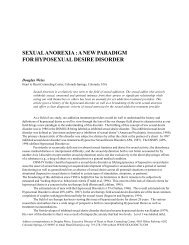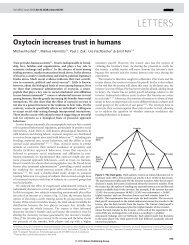16Recent Conceptions <strong>of</strong> Virtue <strong>Ethics</strong>More recent incarnations <strong>of</strong> virtue theory have provided useful points <strong>of</strong> reflection. Hannah Arendtobserved the trial <strong>of</strong> Adolf Eichmann*, the architect <strong>of</strong> the Holocaust, and realized the “banality” <strong>of</strong>his evil related purely to the failure to reflect upon the nature <strong>of</strong> his actions and his mindlessly servileattitudes to duty. 74“Except for an extraordinary diligence in looking out for his personal advancement,(Eichmann) had no motives at all… He merely, to put the matter colloquially, neverrealized what he was doing” (p.114)Arendt’s later development <strong>of</strong> the concept <strong>of</strong> virtue distinguished the virtues <strong>of</strong> individual life andthat <strong>of</strong> the world <strong>of</strong> action (viva activa). 75 For Arendt, the public and private spheres were distinct,the former moving beyond pure self-interest. 76 This revision <strong>of</strong> virtue ethics clearly occurs in thecontext <strong>of</strong> the totalitarian excesses <strong>of</strong> the twentieth century and raises an issue that is pertinent tocontemporary psychiatric ethics – can the psychiatrist be truly virtuous without taking part in thepublic or political sphere?The virtue ethics <strong>of</strong> Alisdair MacIntyre 77-79 further develop the concept <strong>of</strong> the socially situated,contextualized virtue. In Athenian society, the concept <strong>of</strong> the ‘good’ – rrrrrrrrrrrr ‘(agathos – goodangel)’ – related to how a man discharged his allotted social functions within the community, orpolis. As such, the measure <strong>of</strong> the virtue <strong>of</strong> a man was his functioning as a successful citizen. Inancient Athens, this involved political action. To hold on to this as the archetype <strong>of</strong> virtue risksanachronistic versions <strong>of</strong> the moral philosophies, which are “overwhelmingly the creation <strong>of</strong> deadwhite-maleheads <strong>of</strong> household, including some slaveholders and misogynists”. 80 This has been aparticular focus <strong>of</strong> MacIntyre’s arguments about the limits <strong>of</strong> all moral philosophies; that they aresituated within a particular culture at a specific point in history. MacIntyre’s solution is to emphasizethe parts <strong>of</strong> human existence which are universal, such as birth and death, and the establishment <strong>of</strong>community, or what the feminist philosopher Martha Nussbaum refers to as “non-relative virtues”. 81As such, MacIntyre sees it as inconceivable that friendliness, courage and truthfulness would not bevalued in any society at any historical point.MacIntyre’s concept <strong>of</strong> practical wisdom integrates virtue, telos, techne and arete. He considers“practices”, which are the exercise <strong>of</strong> human excellence in the pursuit <strong>of</strong> a collectively defined good.MacIntyre holds that in Greek ethics we begin with society where evaluative language is tied to theconcept <strong>of</strong> a socially established role. He argues that ethical questions “about ourselves and ouractions depend(s) on the kind <strong>of</strong> social structure <strong>of</strong> which we are a part (p.91)”. 82 In MacIntyre’s view,“bricklaying is not a practice; architecture is. Planting turnips is not a practice; farming is (p.188)”. 77Applied to psychiatry, the practice <strong>of</strong> the virtuous psychiatrist is the pursuit <strong>of</strong> expert knowledge,sound judgment and the other components <strong>of</strong> clinical skill and the application to the conception<strong>of</strong> a collective good.The Virtuous PsychiatristApplied to biomedical ethics, various authors and pr<strong>of</strong>essional groups have provided checklists<strong>of</strong> desirable virtues in physicians, <strong>of</strong>ten extrapolated from the four classical virtues. Beauchampand Childress 40 listed compassion, discernment, trustworthiness, integrity and conscientiousness.Engelhardt 83 listed tolerance, liberality and prudence as virtues required <strong>of</strong> a physician. Pellegrinoprovided a hierarchy <strong>of</strong> physician virtues, with the most sublime necessitating such selflesssupererogatory acts that they could not be sustained by even the most devoted physician. 84Indeed, the main critique <strong>of</strong> virtue ethics as a moral philosophy in psychiatry is that it seems tohave impractical expectations <strong>of</strong> individuals and places the individual amidst a potentially disablingpsychodynamic process <strong>of</strong> identification with the idealised ethical superman. 7 Radden outlined thevirtues necessary <strong>of</strong> a psychiatrist 4 (Table 2).* Adolf Eichmann was an Obersturmbannfuehrer (Lt Colonel) in the SS in Nazi Germany. In 1942 he coordinated the Wannseeconference, where the so-called “Final Solution to the Jewish Question” was resolved. Eichmann was tasked with coordinatingthe deportation and mass murder <strong>of</strong> millions <strong>of</strong> European Jews. After the war, he fled to Argentina where he lived under an alias.Mossad agents kidnapped him in 1960. He was taken to Israel, where he was tried and convicted <strong>of</strong> crimes against humanityand then hanged. The philosopher Hannah Arendt watched the trial and then published her reflections on the case in her nowfamous book Eichmann in Jerusalem.
Normative Ethical Theories and Psychiatry1The desirable virtues <strong>of</strong> psychiatristsI. CompassionII. HumilityIII. FidelityIV. TrustworthinessV. Respect for confidentialityVI. VeracityVII. PrudenceVIII. WarmthIX. SensitivityX. HumilityXI. Perseverance17Table 2 – The desirable virtues <strong>of</strong> a psychiatrist (after Radden, 2002)Virtue ethics have been proposed as a foundation <strong>of</strong> psychiatric ethics, 85 with some argument thatthe sole virtue <strong>of</strong> phronesis (practical wisdom) can provide a comprehensive account <strong>of</strong> ethics inpsychiatry 86 or at the very least, inform more prescriptive codes <strong>of</strong> ethics in psychiatry. 87Robertson and Walter have argued that, whilst virtue ethics are <strong>of</strong> great importance, there aresignificant limits to their instrumental value in psychiatric practice. 88 The virtuous psychiatrist reflectsupon his or her motivations and the “big picture” aspects <strong>of</strong> their actions, which are usually based ona balance <strong>of</strong> utility and duty. The habit <strong>of</strong> incorporating this process and finding the “golden mean”is the pathway to phronesis and this, in itself, may provide the psychiatrist with a substantive moralphilosophy. As such, virtue ethics can provide a means <strong>of</strong> informing more practical deliberations,such as those based on consequences, or abiding a social contract.COMMON MORALITY THEORYOne potential source for a concept <strong>of</strong> the good life are those values which are held broadly by asociety. Citizens in democratic societies vote for law-makers, whose legislative proposals representthe wishes <strong>of</strong> the majority <strong>of</strong> citizens. Such a notion <strong>of</strong> the good life therefore moves away fromcriticisms that ethical theories represent ’ivory tower’ views <strong>of</strong> life. The philosopher Bernard Gertcoined the term “common morality theory”, which reflects the broad values <strong>of</strong> citizens living in astable democratic society. 89, 90 Such values are descriptive, as they reflect what people actually do indifferent situations. According to Gert, his normative moral system is based upon five basic harms –death, pain, disability, loss <strong>of</strong> freedom, and loss <strong>of</strong> pleasure. From these five harms, Gert derives tenmorals, reflecting the common morality <strong>of</strong> a society:1. Do not kill2. Do not cause pain3. Do not disable4. Do not deprive <strong>of</strong> freedom5. Do not deprive <strong>of</strong> pleasure6. Do not deceive7. Keep your promises8. Do not cheat9. Obey the law10. Do your dutyThe first five rules directly prohibit inflicting the five basic harms, whereas the second five prohibitactions which may cause those same harms indirectly. These ten moral rules are not absolutebecause their violations are not always wrong.IMET AN OVERVIEW OF PSYCHIATRIC ETHICS
















